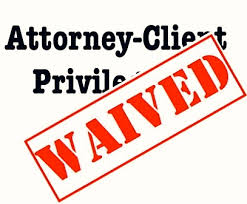
Siegerist v Siegerist 2022 BCSC 1427 reviewed the law of waiver of solicitor/lawyer client privilege.
Files that are part of a communication between a solicitor and client for the purpose of seeking or receiving legal advice and were intended to be privileged: Huang v. Silvercorp Metals Inc., 2017 BCSC 795 at para. 81.
Once a lawyer-client relationship exists, the privilege becomes permanent, unless the client waives it: Descôteaux et al. v. Mierzwinski, [1982] 1 S.C.R. 860 at 872-873; Huang at para. 80; Graham v. Canada (Minister of Justice), 2021 BCCA 118 at para. 44.
Waiver of solicitor-client privilege is ordinarily established where the holder of the privilege voluntarily evinces an intention to waive it. This is referred to as intentional waiver: S. & K. Processors Ltd. v. Campbell Avenue Herring Producers Ltd. (1983), 45 B.C.L.R. 218 (S.C.) at 220; Graham at para. 47.
Waiver may also be implied by the conduct of the privilege-holder in certain circumstances. For example:
a) If a party advances a state of mind defence and relies on legal advice to justify their conduct, a waiver may be inferred: Soprema Inc. v. Wolrige Mahon LLP, 2016 BCCA 471 at para. 22; Graham at para. 47.
b) Where existence of a conversation between a client and solicitor is adduced as evidence of the client’s good faith conduct, the content of the conversation may be subject to waiver: Schwartz Estate v. Kwinter, 2008 ABQB 123 at para. 19.
c) A party may waive privilege by directly raising in a pleading or proceeding the legal advice that they received, thereby putting that advice in issue: York v. Gilligan (1996), 19 B.C.L.R. (3d) 40 (S.C.) at para. 14; McDermott v. McDermott, 2013 BCSC 534 at para. 116.
d) A party may waive privilege by denying that they gave certain instructions to their lawyer: York at para. 14.
e) Waiver may be found to have occurred more generally where fairness and consistency require this result due to selective but limited disclosure by the party resisting production. The court summarized the applicable principles in this respect in United States v. Meng, 2020 BCSC 1461 [Meng]:
Implicit waiver may take place where a party does not expressly waive privilege, but takes a position in relation to privileged materials that is inconsistent with maintaining the privilege. This may be by, for example, selectively disclosing part of a privileged document or a category of privileged documents on a particular subject, but withholding the remainder of the document or other documents on that same subject. In these circumstances, to uphold the privilege over the remaining communications would be unfair, because the opposing party and the court would be deprived of access to the full narrative. In Huang v. Silvercorp Metals Inc., 2017 BCSC 795 at para. 143, Madam Justice Warren explained:
The common thread in the cases where implied waiver is found is that the privilege holder has attempted to use and, at the same time, to shelter behind privileged documents. In such cases, fairness and consistency require production because the privilege holder uses the privilege as a sword to justify or explain a position or action while also using the privilege as a shield to prevent the other party from testing the justification or explanation.
Waiver once made, cannot be retracted.
The decisions in Cheung et al. v. 518402 B.C. Ltd., [1999] B.C.J. No. 2415 (S.C.) at paras. 13 and 22, and Casino Tropical Plants Ltd. [v. Rentokil Tropical Plant Services Ltd. (1998), 55 B.C.L.R. (3d) 233 (S.C.)] at para. 16, once a waiver of privilege has been made it cannot be retracted. This is a logical consequence of the waiver, as being able to retract it would result in untenable litigation advantages and general unfairness.
See also: Do Process LP v. Infokey Software Inc., 2015 BCCA 52 at paras. 30-32



